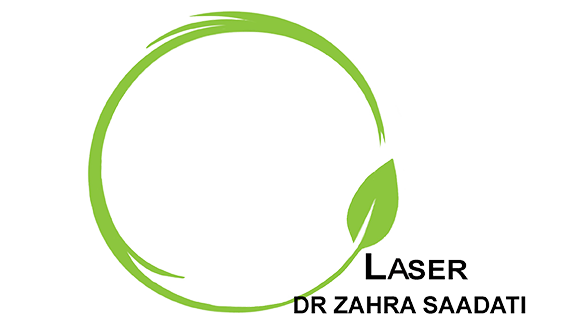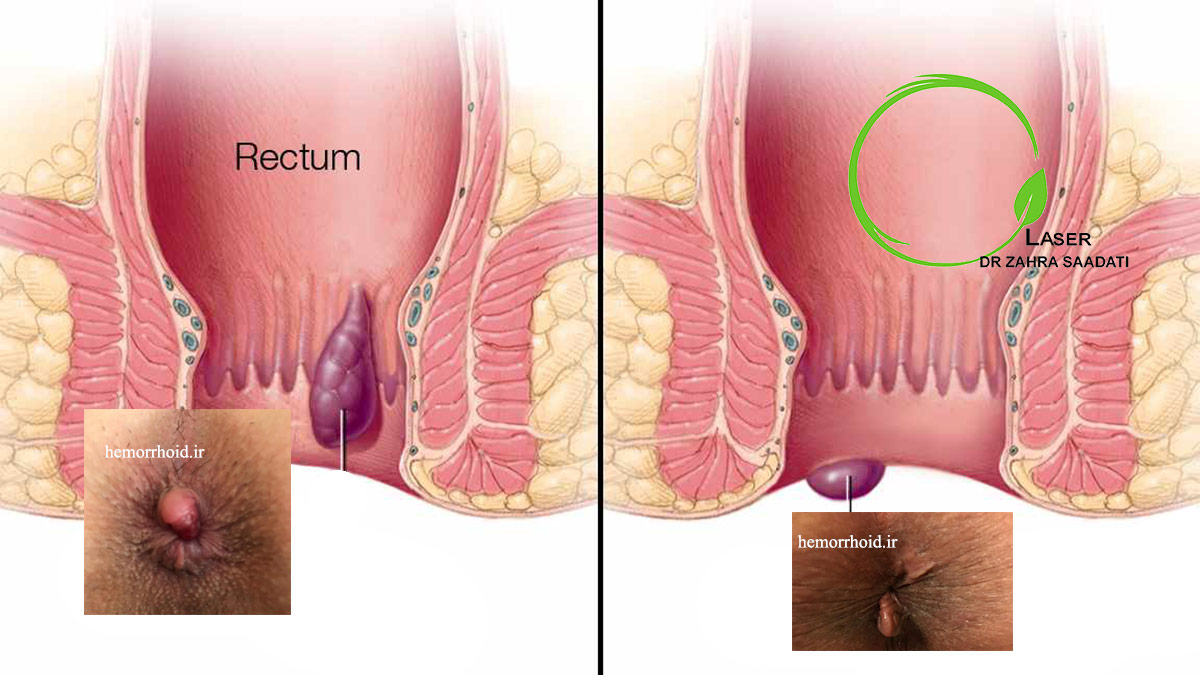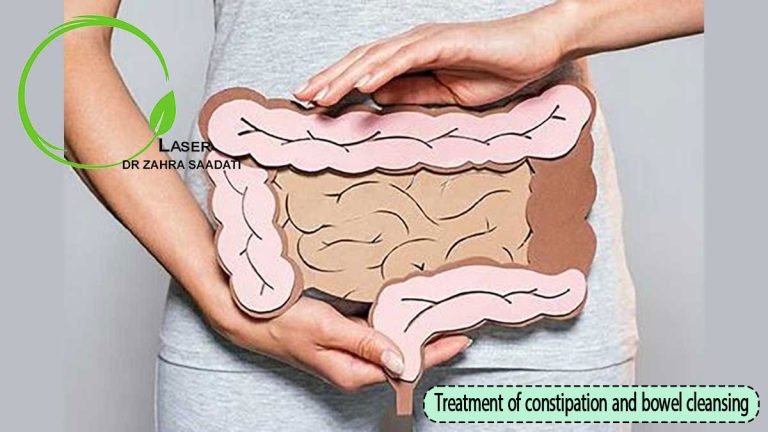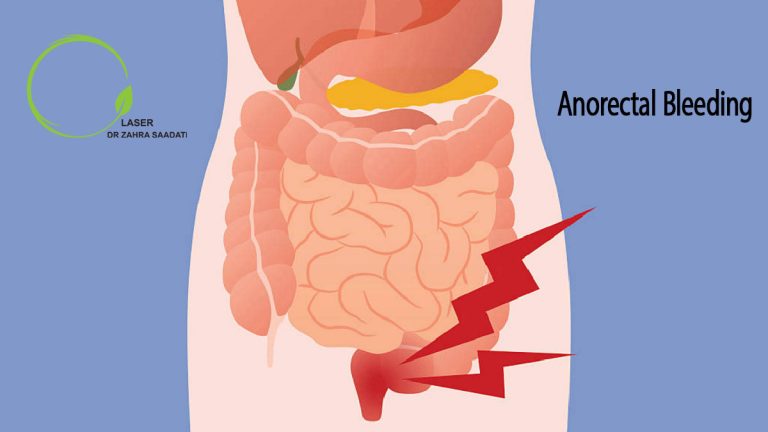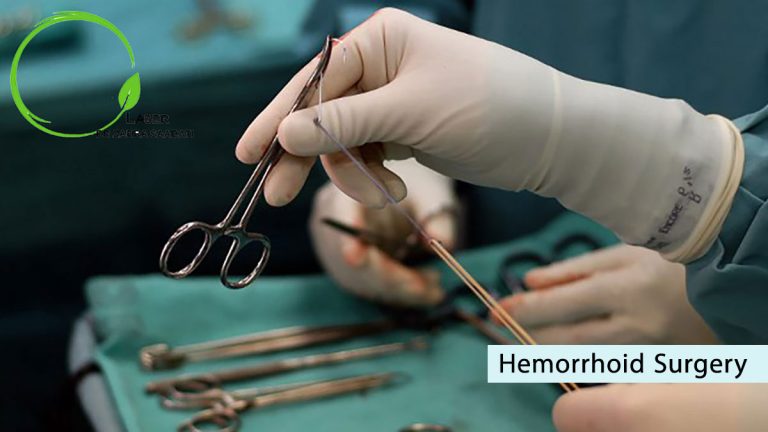Here you can find the answer to any question about hemorrhoid or piles. You can write your questions at the end of this post and wait for a direct response from Dr. Saadati, a general surgeon and laser surgery specialist. Regardless of gender and race, hemorrhoid may occur in men, women, and children. However, women after pregnancy are at higher risk of developing this disease compare to men. Parents should also be sensitive to their children’s defecation status and take the necessary medical procedure in case of any anal problem.
What is a hemorrhoid?
Hemorrhoid are protrusions of blood vessels and connective tissue that help the movement of feces out in the anal canal. Hemorrhoid and bleeding do not necessarily occur at the same time; some patients may report a mass and protrusion in the anus. However, these vessels may get abnormal, inflamed, and painful for various reasons. When there is a blood clot trapped in this area that causes pain, it is called thrombosed hemorrhoid. About 50% of people suffer from hemorrhoid at least once during their lifetime. Hemorrhoid treatment and management can be effective in preventing the recurrence of this disease. The prevalence of hemorrhoid is higher in people aged 45 to 65 years.
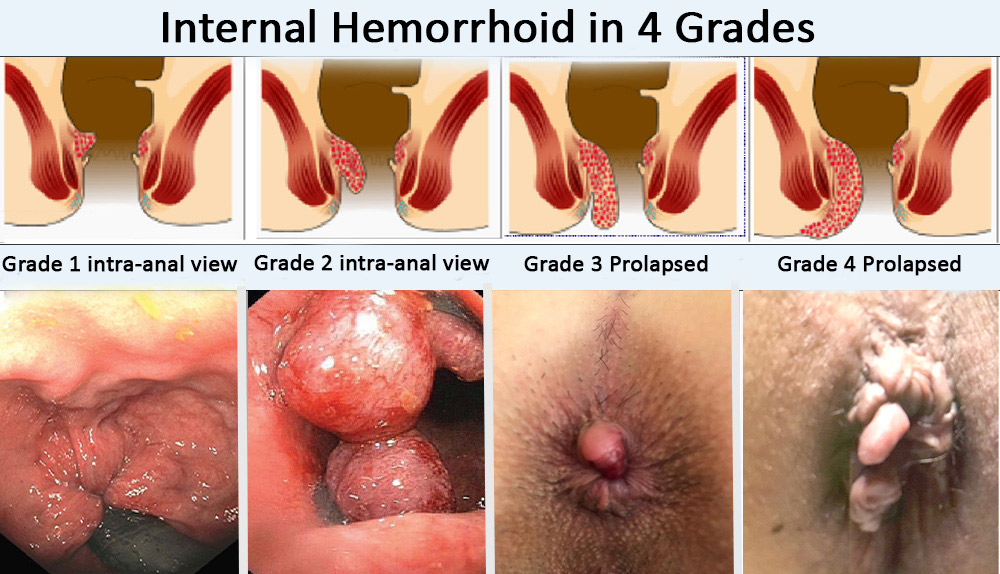
Types of hemorrhoid
Depending on their location, hemorrhoid or piles are either internal or external; internal hemorrhoid occur above the dentate line and external hemorrhoid occur below the dentate line and at the beginning of the anus.
Thrombosed hemorrhoid
Thrombosed hemorrhoid refer to a condition in which the hemorrhoid paque turns into a bruised and painful lump in the endoderm. Patients with thrombosed hemorrhoid may visit a physician complaining of severe and annoying pain within the first 48 to 72 hours. However, their pain gradually subsides. The best treatment for thrombosed hemorrhoid in the early stage of the disease is a high-power hemorrhoid laser. However, medication can be also a suitable option if the pain is relieved after a while. If the pain is not relieving and there is also a risk of hemorrhoid burst, the preferable choice is the physical removal of thrombosed hemorrhoid through a high-power laser.
Patients with hemorrhoids are typically prescribed a period of medication. Nevertheless, the best treatment option for those with severe pain and the risk of hemorrhoid burst is immediate conventional surgery or laser surgery.
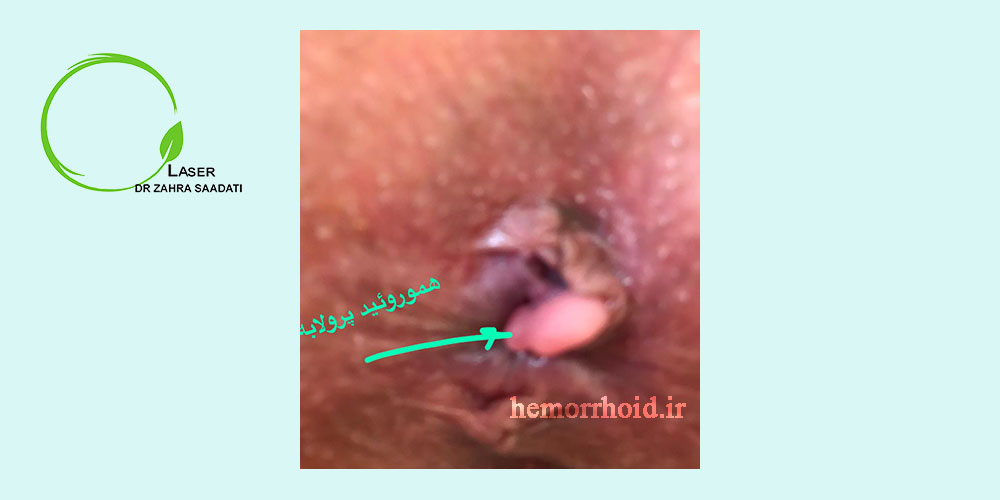
Symptoms of hemorrhoids
You need to visit a surgeon to definitively diagnose hemorrhoid. Any of the following symptoms can be a sign of hemorrhoid and helps you choose the best specialist to visit. After noticing any of the hemorrhoid symptoms, visit a general surgeon specializing in laser therapy.
- Bleeding: Painless bleeding is the first and most common symptom of hemorrhoid, especially internal hemorrhoid. You may see blood streaks in your feces or blood drips after defecation. Patients who visit a physician with bleeding, especially with blood streaks mixed with feces, should be examined for all causes of rectal bleeding.
- Lump: The second symptom is the protrusion of hemorrhoid veins from the anus.
- Pain: The third symptom of hemorrhoid is anal pain. Patents with thrombosed or necrosed internal hemorrhoid of grades 3 and 4 and thrombosed external hemorrhoid may report anal pain.
- Other symptoms: Other symptoms of hemorrhoid include mucosal discharges, a sense of incomplete defecation, fecal incontinence, anal inflammation and swelling, and anal itching.
The best diet for patients with hemorrhoids
The most effective treatment for hemorrhoid is to follow a diet full of fiber. The best diet for a patient with hemorrhoid should consist of vegetables, fresh fruit, legumes, whole-grain bread, brown rice, nuts, beans, and lentils. Such patients should avoid eating foods that dehydrate the body and cause constipation. Rice, white bread, and fast foods are among the foods that can cause constipation, which is a risk factor for hemorrhoid. In addition, drinking coffee and tea leads to body dehydration and thereby constipation because they are diuretic.
Hemorrhoid treatment
There are different treatments for hemorrhoids depending on their types. As mentioned earlier, the only treatment option for patients with a risk of hemorrhoid burst is immediate surgery. All patients with hemorrhoids are recommended to change their lifestyle and follow a healthy and fiber-rich diet. If it is a few days that you feel you have hemorrhoids, you are recommended to start home remedies. If the home remedies fail to improve the condition within a week, you need to visit a general surgeon. The specialist may prescribe you medicines, ointments, and rectal suppositories. If the condition remains unimproved after the medication period, the specialist may recommend you one of the conventional surgical procedures or laser surgery. Other treatments of hemorrhoids, such as rubber band ligation, are not discussed here because they are completely obsolete.
Inflammatory bowel disease (IBD) is among the contraindications for anal surgeries because surgical wounds will heal very late in patients with this disease. There are some reports that the wounds caused by hemorrhoid surgery have not healed in patients with IBD.
Home remedies for hemorrhoid
All patients with hemorrhoid have already experienced a period of constipation. Therefore, the most important part of a home remedy for hemorrhoid is constipation control. For this purpose, it is recommended to follow a diet containing vegetables, legumes, whole-grain bread, and brown rice. In fact, you should consume 300 g of fiber every day.
- Exercises such as walking 30 minutes per day, yoga, and pilates can lead to regular bowel movements and, thereby, prevent constipation. Moreover, regular exercise facilitates blood circulation in this area and improves possible problems.
- Have a regular schedule for defecation; for example, go to the toilet for defecating twice a day at certain times. It is also recommended to immediately go to the toilet whenever you feel you need to defecate. Delayed defecation can lead to fecal dryness and stiffness.
- It is recommended to sit in a basin of warm water for 15 minutes after defecation. If you repeat it 2 or 3 times a day, it helps regular blood circulation and pain relief in the anal area.
- Use honey and wet toilet paper to facilitate pain relief and hemorrhoid healing.
- Sit on soft cushions, instead of hard surfaces, to improve swelling in the anal area.
- You can also put a small ice pack on the anal area to reduce swelling.
- Place a step, squatty potty, or a small stool in front of the toilet to facilitate complete and easier defecation.
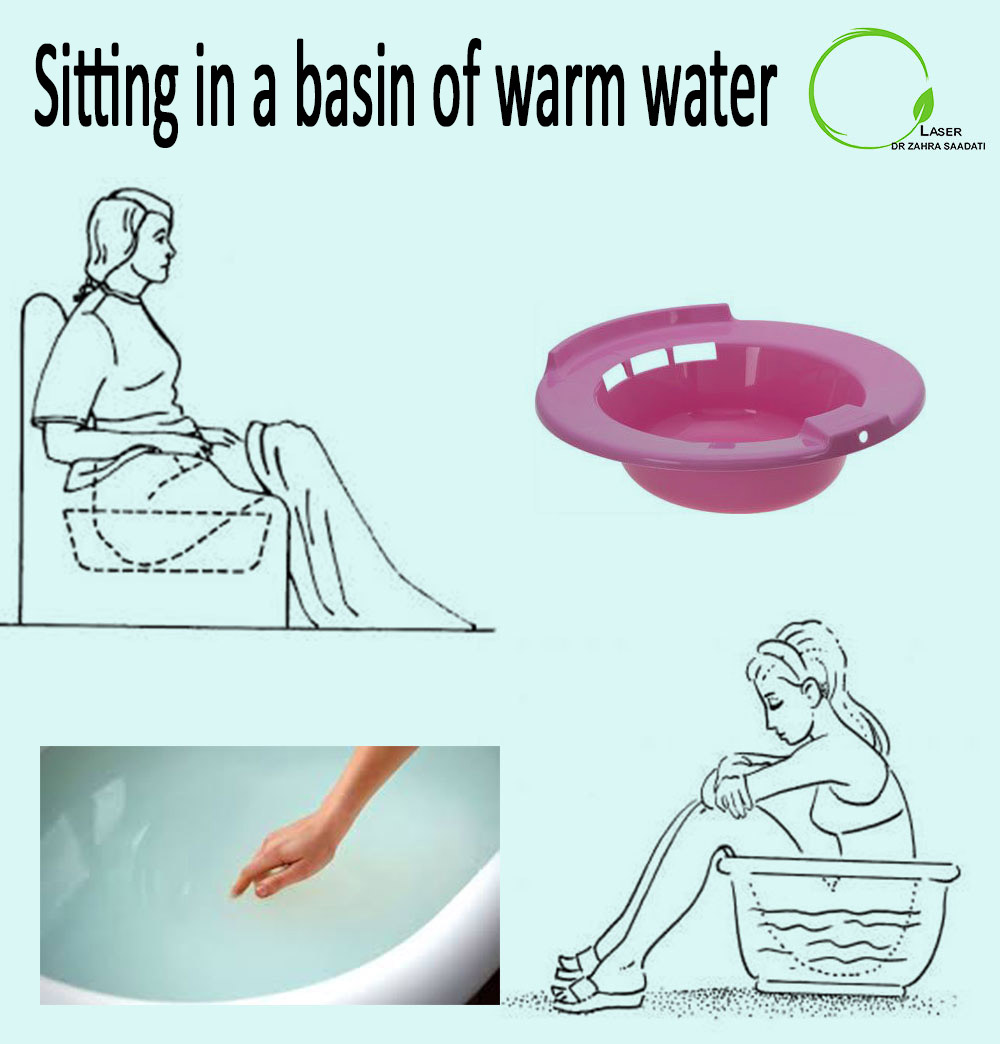
How to sit in a basin of warm water
To sit in a basin of warm water, you should be in a squatting position in a way that hips and feet are inside the water. Sitting in a basin of warm water for 15-20 minutes not only cleans the anal area but also improves any inflammation in this area. There is no need to add betadine to water. Note that the water should not be too hot to irritate your skin.
- You do not need a lot of water; about 2 inches of warm water is enough. There is no need to add washing gel, betadine, or shampoo.
- The water should be warm enough in a way that you can easily put your hands inside the water.
- Sit in a basin of warm water 2 or 3 times a day and then dry the area using a soft towel or hair dryer.
- You can also use aloe vera gel as a home remedy for hemorrhoids. Click here to watch a video titled “the miracle of getting rid of hemorrhoids”.
- At the discretion of your doctor, you can add a little salt to the warm water.
Medication for hemorrhoid
Note that medication for hemorrhoids will not work without home remedies and constipation control. You need to visit a general surgeon if the condition does not improve after one week of following home remedies. The general surgeon may prescribe an ointment, a cream, and pills from the following three groups:
- Painkillers: Such as diclofenac suppositories, acetaminophen, or Gelofen, which have both anti-inflammatory and analgesic properties. Note that the excessive use of painkillers can lead to constipation.
- Laxatives: These drugs may be available as syrups or powders. Note that the excessive and unplanned use of laxatives can lead to lazy bowel syndrome. In addition, laxatives should be taken at a dosage that cause neither diarrhea nor constipation.
- Wound healing drugs: Such as zinc cream and a variety of other ointments that are supplied to the market in large quantities every day. It is better to consult your physician in this regard.
- Anti-hemorrhoid steroid drugs: Although this group of ointments or suppositories repair damaged tissue, they have some side effects. As a result, they should not be used for more than 1-2 weeks because they may lead to atrophy and thinning of the anal skin. The misuse of anti-hemorrhoid ointment ointments can ultimately cause severe bleeding and itching. This group of drugs is not sold without a doctor’s prescription.
- You can use proctofoam for extra-anal inflammation.
- Some of the side effects of the misuse of corticosteroids are skin rashes and anal irritation and itching.
Effects of anti-hemorrhoid drugs and their mechanism of effect
Anti-hemorrhoid drugs typically have anesthetic and vasoconstrictive effects. The local anesthesia of hemorrhoids temporarily relieves the patient’s pain. The vasoconstrictive effects of anti-hemorrhoid drugs reduce not only pain and itching but also bleeding. In addition, they shrink the hemorrhoid paque and prevent itching and irritation by creating a protective layer on it.

Hemorrhoid treatment during pregnancy?
Medication and home remedies are the only options for treating hemorrhoids during pregnancy. Pregnant women with hemorrhoids should wait until delivery to receive more specialized treatments. The use of an ice bag several times a day can be effective, and sitting in a basin of warm water can reduce the inflammation and pain caused by hemorrhoids. Use unscented wet wipes or soft white wipes to clean and dry the anal area after defecation. Physicians usually do not prescribe oral or suppository medication for pregnant women with hemorrhoids. However, whenever the symptoms worsen, visit your physician to change your medication.
Surgical treatment of hemorrhoid
If any of the above-mentioned treatments do not produce positive results, the general surgeon may recommend the patient to undergo hemorrhoid surgery. You are recommended to use new methods such as laser for surgery and visit an experienced general surgeon and laser surgery specialist for this purpose. This allows you to go through a short period of recovery and have a positive experience of hemorrhoid surgery. Since the risk of hemorrhoid recurrence is almost zero after laser surgery.
You should undergo a surgical procedure to treat hemorrhoids when:
- hemorrhoids get chronic and do not respond to medication and home remedies;
- you have chronic bleeding and protruded hemorrhoids;
- you have anal skin tags; and
- hemorrhoids cause problems with defecation and affect the patient’s normal life.
A comparison between conventional surgery and laser surgery for hemorrhoid
Hemorrhoid surgery may be performed with or without laser equipment. Hemorrhoid laser surgery can be done under either local anesthesia or general anesthesia, whereas conventional surgery using blades and cauters usually requires general anesthesia.
Closed hemorrhoidectomy is a surgical procedure in which the wound is sutured after removing the hemorrhoid paque, whereas the wound is left open in open hemorrhoidectomy. The tool used for making incisions in this procedure is of special importance. Laser surgery usually does not require stitches; in addition, the laser light quickly repairs the affected vessels and nerves at the surgical site. Therefore, not only there is no need for stitches but also the patient will not experience pain and bleeding.
Laser equipment allows the general surgeon to treat a wide area of the body because the laser does not damage the surrounding healthy tissues. Laser surgery also allows the simultaneous removal of three hemorrhoid paques. It is not recommended to remove more than three hemorrhoid paques because it can cause anal stenosis and fecal incontinence. Hemorrhoid laser surgery lasts shorter than conventional surgery. The patient can be discharged 1 or 2 hours after the surgery at the doctor’s permission and need to rest at home only one night before returning to normal life or the workplace the next day.
Hemorrhoid laser therapy
This is a nonsurgical and noninvasive treatment of hemorrhoid. The laser used in this treatment is different from the high-power laser used in surgical procedures. Hemorrhoid laser therapy is performed by a low-power laser called infrared coagulation (IRC) or infrared photocoagulation.
In this method, which is usually employed for non-protruded hemorrhoid, the laser light is emitted to the hemorrhoid paque to decompose the blood clots and ease their absorption. This method requires no incision and does not damage the hemorrhoid.
Laser therapy can be also performed after hemorrhoid surgery; in this case, a certain intensity of laser light is emitted to the surgical site in order to accelerate and facilitate postoperative wound healing.
Removal of external thrombosed hemorrhoid
When the patient visits a physician complaining of severe pain from thrombosed hemorrhoid within the first three days of the disease, it is necessary to remove the blood clot from the hemorrhoid paque. In addition, the hemorrhoid paque itself should be drained and removed during a hemorrhoidectomy. If the patient tolerates the pain within the first three days of the disease and does not visit a physician, the blood clot in the thrombosed hemorrhoid may be reabsorbed but the resulting anal skin tag will remain. Sitting in a basin of warm water and taking anti-inflammatory painkillers are the best ways to relieve thrombosed hemorrhoid.
Complications of hemorrhoids
Some patients who avoid visiting a general surgeon for treating hemorrhoids because of a sense of embarrassment may suffer from complications of this disease. One of the common complications of hemorrhoids is anemia caused by heavy bleeding and severe pain. The worst complications of hemorrhoids are protrusion and tissue infection and necrosis. Inflammation and swelling of the anal muscle, anal ulcers and irritation, and mild to severe fever (in cases where the patient gets an infection) are other complications of untreated hemorrhoids. Some patients tolerate these complications based on a false assumption that hemorrhoids will heal on their own. Unfortunately, there are reports that some of these patients suffer from unknown anal problems and various anorectal diseases.
Frequently asked questions (FAQ) about hemorrhoid:
1-What kind of doctor should I visit about my hemorrhoid?
You can visit a general surgeon and laser surgery specialist to treat hemorrhoid or piles. Dr. Zahra Saadati, a general surgeon and laser surgery specialist, has successfully performed many cases of laser surgery for hemorrhoid, fissures, and other anorectal diseases since 2007. You visit Dr. Saadati at Unit 10, No. 457, 9th Golestan, Pasdaran St., Tehran, Iran or make an appointment with her through the telephone number 0098 22761600.
2-How to get rid of hemorrhoid?
In the early stages of the disease, you can improve hemorrhoid by controlling constipation and other causes of the disease. If home remedies fail to improve the symptoms within one week, you should visit a general surgeon and laser surgery specialist for more specialized treatments.
3-What are different types of hemorrhoid?
Thrombosed hemorrhoid occur like a large hot bulb in the anus, internal hemorrhoid are usually characterized by pain and itching, and external hemorrhoid are swollen and painful veins appearing as anal skin tags.
4-Is hemorrhoid serious and dangerous?
This disease is not inherently dangerous, but it may cause more serious and dangerous diseases if remain untreated.
5-Are hemorrhoids excretable?
When you have internal, external, or thrombosed hemorrhoids, you may feel that there is a hard pimple inside your anus. If you do not take quick action to treat hemorrhoids and leave them to heal on their own, the blood trapped in this area will be drained due to pressure and you will have bleeding. You may wrongly assume that the bleeding is a sign of the hemorrhoid paque removal, but hemorrhoids recur from the same area. Therefore, hemorrhoids are not excretable on their own.
6-How do doctors treat hemorrhoid?
Doctors first make pieces of advice and prescribe medication to control the disease. They also examine the anal area to make sure there are no infections, polyps, masses, and fistulas in the area. If the medication does not produce positive results, the doctor may recommend the patient undergo conventional surgery or laser surgery.
7-What is analplasty?
An analplasty is a treatment for anal stenosis. Some patients may develop anal stenosis after multiple or extensive hemorrhoid and fissure surgeries. In these cases, an analplasty is performed along with a sphincterotomy. Studies show that extensive hemorrhoids are responsible for 90% of cases of anal stenosis. Both analplasty and medication are common treatments for anal stenosis. Medication alone suffices for the treatment of mild anal stenosis.
8-What is the application of metronidazole in the treatment of hemorrhoids or piles?
In cases where hemorrhoids are accompanied by infections and ulcers, the specialist may prescribe metronidazole (as an antibiotic) for the patient to control infractions. Since metronidazole can cause constipation, which is one of the risk factors for hemorrhoids, doctors are recommended not to prescribe this drug or prescribe it along with laxatives and an appropriate diet.
9-Is diclofenac suppository harmful to hemorrhoids?
Suppositories are not generally recommended because they put pressure on the anus. Instead of a diclofenac suppository, it is better to use alternative Injectable, oral, or topical pain relievers to reduce hemorrhoids pain and inflammation.
10-What is the relationship between hemorrhoids and bleeding?
Some types of hemorrhoids do not cause bleeding, but the patient may see a few drops of bright blood if the hemorrhoid paque is injured. In case of thrombosed hemorrhoids, the patient may pass a large amount of clear blood at once because there are many blood clots in the area that are suddenly discharged when the hemorrhoid wall ruptures, leaving an anal skin tag.
